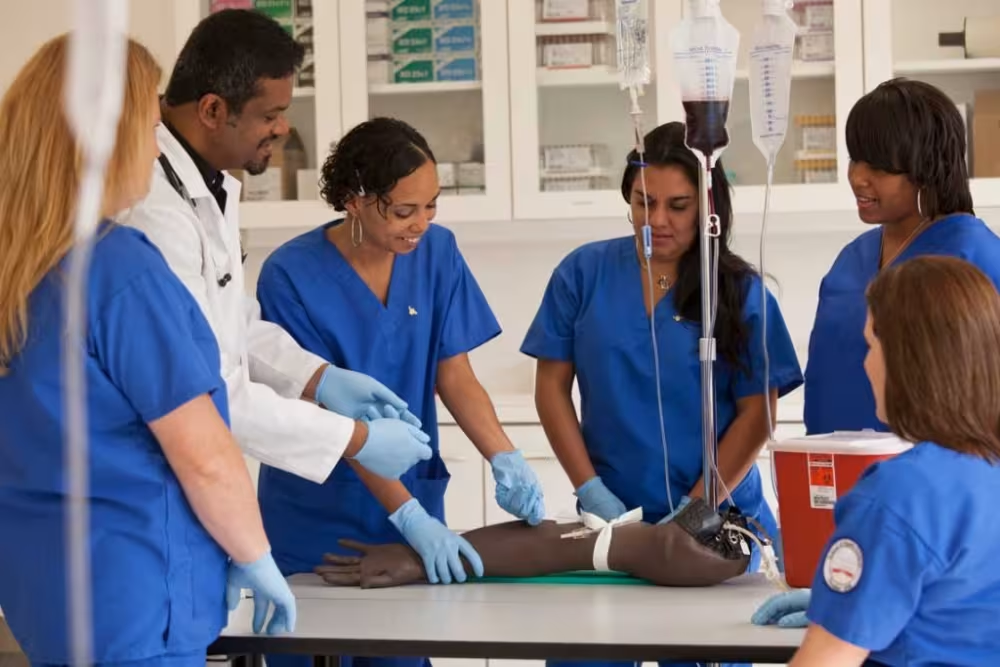What Do You Learn in Nursing School?
Each blog post is dated and contains accurate information as of that date. Certain information may have changed since the blog post’s publication date. If you would like to confirm the current accuracy of blog information, please visit our ABSN overview page or contact admissions at (866) 891-9308.
Discover essential skills and components of what you learn in nursing school. Explore Pacific Lutheran University’s ABSN program and its offerings. The ABSN program prepares future nurses through coursework, simulation labs, and clinical experiences. Take the first step into your journey of nursing.

Those searching for in-demand, rewarding careers often find themselves drawn to nursing. Aspiring nurses and those considering a future in the field may have questions about the details of their future education. Making a meaningful impact on others’ lives is undoubtedly fulfilling, and getting to that point is a challenge requiring dedication and hard work.
Nursing school is purposely rigorous to cover a wide range of information and prepare future nurses for the realities of this demanding field. Through our in-depth educational process, Pacific Lutheran University’s Accelerated Bachelor of Science in Nursing program (PLU ABSN), competent and compassionate nurses over 16 months.
Each component of PLU’s ABSN curriculum will develop your skills in different areas and comprise what you learn in nursing school. Now, let’s explore more of the nursing school experience.
Key Skills Students Learn in Nursing School
In nursing school, students learn theory and practice. They also instill a comprehensive array of essential skills for competent and compassionate patient care. The American Association of Colleges of Nursing (AACN) identifies core values known as the AACN Essentials, which make up the framework of nursing education. The values encompass clinical skills, critical thinking, ethical decision-making, and effective communication.

The PLU ABSN program incorporates these essential values into its hybrid curriculum. Students learn, visualize, and put these values into practice in classes, labs, and clinicals. BSN-level students are expected to understand and embody the following professional values:
- Altruism: genuine concern for the welfare of others
- Advocacy: champion the right to self-determination on behalf of patients
- Human dignity: respect for the inherent worth and unique individuality of all people
- Integrity: adhering to the accepted code of ethics and standard of practice for professional nurses
- Social justice: acting in accordance with fair treatment of all people, regardless of economic status, race, ethnicity, citizenship, disability, or sexual orientation

Discover more about what skills are needed in nursing.
Coursework
Nursing school coursework spans various topics, encompassing foundational sciences, nursing theory, and clinical practice. Students study anatomy, physiology, pharmacology, and pathophysiology, which help to develop a robust understanding of the human body and its intricate mechanisms. Meanwhile, nursing theory courses explore patient-centered care, evidence-based practice, and cultural competence, laying the groundwork for holistic patient care.
The coursework in nursing school gives students a comprehensive understanding of the theoretical and scientific foundations of nursing practice. Nurses have a unique and crucial role as healthcare providers. They are responsible for most of the day-to-day patient care and communication while managing technical and administrative tasks. Because of this, students need to learn the essential skills for a successful nursing career.
Simulation Labs
At PLU, we allow students to learn in a controlled environment where they can practice clinical skills in a realistic setting. This entails procedures as basic as taking vital signs to complex scenarios like managing healthcare emergencies. Hands-on experience is what makes simulation labs valuable. These immersive simulations prepare students to handle a diverse range of patient scenarios with confidence and competence.

Clinicals
Clinical rotations place students in actual healthcare settings, allowing them to apply theoretical knowledge and simulation lab skills in patient care. Under the guidance of clinical instructors, students gain practical experience in areas such as medical-surgical nursing, pediatrics, and critical care. Clinicals expose students to different patient populations and healthcare settings, fostering clinical judgment and critical thinking skills.
Classes Required for Nursing Students
The specific classes required for nursing students may vary depending on the program and institution. However, certain foundational courses are common across nursing programs. At PLU, students in the ABSN program can expect a comprehensive nursing curriculum to prepare them for professional practice.
Explore the ABSN courses offered at Pacific Lutheran University.
Start Your Journey into Nursing Today
Nursing school is a transformative experience that prepares you for the challenges and rewards of a nursing career. Students develop clinical competence, critical thinking skills, and professional values essential to nursing practice through coursework, simulation labs, and clinical rotations.
Nursing school is the first step toward realizing your goals if you are passionate about healthcare and committed to making a difference. ABSN program graduates are well-prepared to take on leadership, management, and specialized nursing roles in healthcare.
At PLU, we offer an exceptional nursing education through our ABSN program. With academic rigor, hands-on education, and clinical experiences, we equip you with the skills and knowledge for a successful nursing career.
Contact us to start your nursing journey and make a difference in healthcare.
